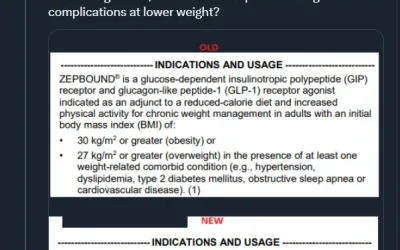When to Refer Patients to an Obesity Medicine Specialist
Obesity is a complex chronic disease that often requires specialized medical expertise. For healthcare providers, knowing when to refer patients to obesity medicine specialists and bariatric medicine experts can significantly impact patient outcomes. This guide will help you understand the key indicators for referral and how comprehensive obesity care can benefit your patients.
“Every healthcare provider wants the best for their patients,” explains Dr. Mike Albert, Chief Medical Officer and co-founder of Accomplish Health. “The challenge is that obesity treatment has evolved significantly, requiring both specialized expertise and administrative knowledge to ensure patients get the care they need.”
Understanding When to Refer
Complex Cases and High BMI
“Most patients with a BMI over 50 need to be evaluated for surgery and work with medical weight management specialists in the post-op period,” notes Dr. Gregory Schroder, bariatric medicine specialist at Sentara Comprehensive Weight Loss Solutions. “That’s where they get the most benefit. We’ve seen patients achieve 60-65% excess body weight loss or more when we partner with comprehensive medical care in the post-op period.”
Multiple Comorbidities in Obesity Treatment
Patients with obesity-related health conditions often require specialized care coordination. Key indicators include:
- Uncontrolled diabetes
- Sleep apnea
- Cardiovascular complications
- Multiple failed weight loss attempts
- Complex medication management needs
Administrative Barriers in Obesity Care
“The landscape of obesity treatment isn’t always clear regarding insurance coverage and care accessibility,” explains Dr. Albert. “We have particular expertise in helping navigate that landscape, helping identify services patients qualify for, and securing approval through their benefits.”
Benefits of Timely Referral to Obesity Medicine Specialists
Shorter Wait Times
While many specialty clinics have extended waiting periods, comprehensive obesity medicine practices often provide faster access to care. “We can typically get new patients in within two to four weeks,” notes Dr. Albert. “This helps prevent care delays that could impact patient outcomes.”
Comprehensive Care Coordination
Modern obesity treatment often requires multiple approaches working together. “It’s just like any other disease – there’s no one treatment that addresses everything completely,” explains Dr. Schroder. “We need multiple treatments working together, whether that’s minimally invasive surgery in conjunction with medical weight loss or other combinations of therapy.”
Insurance Navigation
Obesity medicine specialists have dedicated resources for managing insurance approvals and coverage verification, helping ensure patients can access necessary treatments, including:
- FDA-approved medications
- Nutritional counseling
- Behavioral health support
- Surgical evaluations when appropriate
Making the Referral Decision
Key Indicators for Referral:
- BMI > 40 or BMI > 35 with comorbidities
- Failed previous weight loss attempts
- Complex medical history requiring specialized management
- Need for pre-surgical evaluation or post-surgical support
- Medication interactions requiring expert oversight
Pre-Referral Steps
Before referring, consider:
- Gathering complete medical history
- Documenting previous weight loss attempts
- Collecting relevant lab work
- Noting current medications and complications
- Addressing patient preferences regarding treatment options
The Role of Collaborative Care
“What we’re seeing is the importance of collaboration between surgical and medical approaches,” notes Shelly Russell, Director of Medical Partnerships at Accomplish Health. “When we work together, we can offer patients comprehensive solutions that address both immediate and long-term needs.”
Post-Referral Care Coordination
After referral, obesity medicine specialists will:
- Provide regular updates on patient progress
- Coordinate with other specialists as needed
- Manage medication adjustments
- Support long-term weight maintenance
- Handle insurance authorizations
Final Thoughts
Making appropriate and timely referrals to obesity medicine specialists can significantly improve patient outcomes. By understanding when to refer patients and what specialized care can offer, you can help ensure that your patients receive the comprehensive treatment they need.
Ready to learn more about medical obesity care? Schedule a consultation with an Accomplish Health physician today.
Disclosures:
- Cofounder and CMO of Accomplish Health: a comprehensive virtual obesity medicine platform for patients, providers, and payors
- Consultancy: Elo Health, Gelesis, and Novo Nordisk



